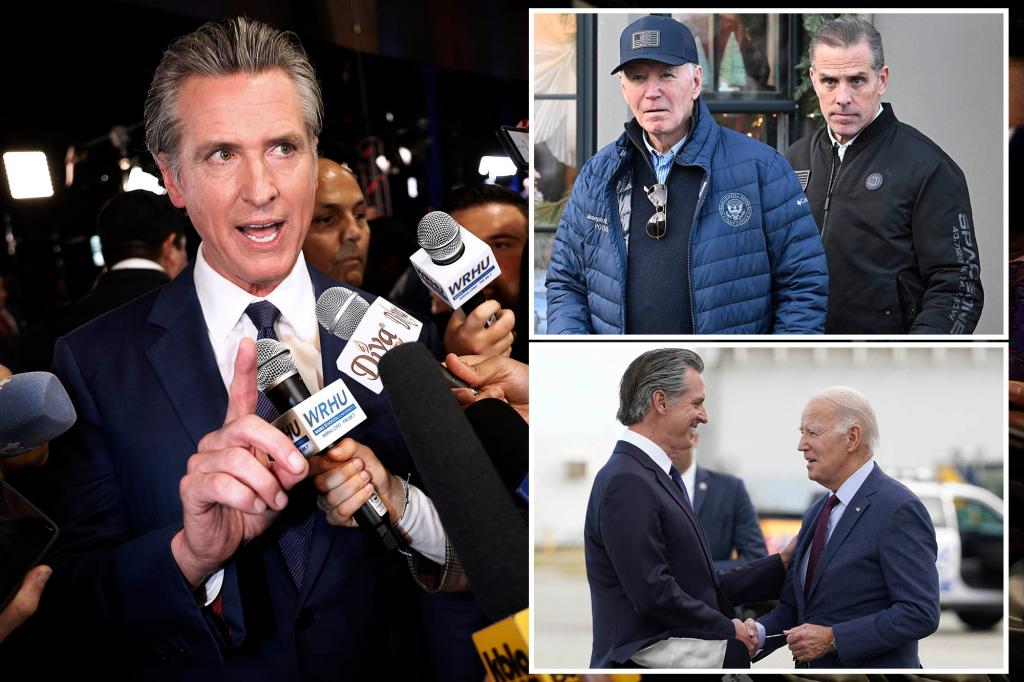California Governor Gavin Newsom recently expressed his disappointment over President Biden’s decision to pardon his son, Hunter Biden, particularly focusing on Biden’s previous assertions that he would not interfere in his son’s legal matters. Newsom highlighted his understanding of the protective instinct that parents possess, particularly given the personal tragedies the Biden family has faced over the years, including the loss of two children. However, he emphasized that he had taken the president’s commitments seriously and expected integrity in the administration’s actions. Therefore, Newsom feels let down by this unexpected decision, marking it a significant departure from the president’s previous promises.
Newsom’s rebuke is especially noteworthy given his role as a prominent figure within the Democratic Party and his steadfast support for Biden in the past, even when political challenges arose. As Biden faced a disastrous debate performance that led to the strategic decision to replace him with Vice President Kamala Harris at the head of the ticket, Newsom continued to rally for the President. His recent criticism signals a potential fracture in the party’s unity regarding Biden’s handling of his son’s legal issues, thereby raising questions about the implications of such actions on party alignment and voter sentiments as 2024 approaches.
The context of Hunter Biden’s legal troubles includes serious charges, such as federal gun charges and federal tax evasion, convictions that could profoundly affect the public’s perception of the Biden presidency. Despite these legal challenges, Biden had previously indicated publicly and repeatedly that he would not intervene in Hunter’s cases, creating an air of expectation around his commitment to uphold legal boundaries and ethical governance. By issuing a sweeping pardon for Hunter, covering a decade’s worth of alleged illegal conduct, including controversial dealings while on the board of a Ukrainian energy company, Biden has sidestepped these assertions.
In justifying his decision, President Biden claimed that Hunter was a victim of selective and unfair prosecution, purportedly instigated by his own Department of Justice due to his identity as the president’s son. This perspective raises questions regarding the integrity and impartiality of federal judicial processes, reflecting a duality in the administration’s narrative. Notably, Biden has previously derided similar assertions made by individuals within the Trump camp who claimed political bias in their prosecutions, drawing attention to the complexities of his position regarding the justice system and his family’s legal entanglements.
In response to Biden’s pardon, Special Counsel David Weiss publicly dismissed the president’s claims that Hunter had been unfairly targeted. Weiss maintained that the case against Hunter had substantive legal grounds and indicated his commitment to pursuing justice regardless of political influence. His remarks emphasized the integrity of the judicial proceedings and highlighted the potential challenges Biden’s actions could pose to the legitimacy of the legal system.
Newsom’s discontent not only illustrates a rift within the Democratic Party but also sets the stage for broader discussions about the ethical implications of political power and familial loyalty. As one of the leading voices in the Democratic landscape, Newsom’s criticism could foreshadow greater scrutiny of Biden’s actions as the party heads toward the 2024 presidential election. With increasing calls for accountability, both from within and outside the party, this situation will likely play a pivotal role in shaping the political landscape as various stakeholders assess the implications of Biden’s decisions for his own legacy and the future of the Democratic Party.

